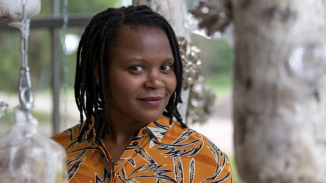New thinking for a new world
Govera, who is 36, has already accomplished much with that insight. Mushrooms are a fast-yielding crop that require less space, water, and energy than other crops. They are easy to cultivate and to harvest, so they provide both nutrition and income, and they can be grown at scale and commercialized. With the support of her network and friends, Govera quickly became an expert on mushroom cultivation as well as an innovator to improve the economics of mushroom farming. For example, she pioneered the use of coffee grounds—cheap and readily available almost everywhere—as a medium to grow mushrooms commercially.
Transformation in action
But Chido Govera wanted more than just to find her own way out of poverty; she wanted to help others, especially orphans, women and girls, who deserved better lives. That meant she needed to build a platform that could extend her work. The result: in 2013 she launched The Future of Hope Foundation. The Foundation, focused on orphans and women, works to help its vulnerable clients out of poverty through entrepreneurial and self-help initiatives. The core idea is to help people find sustainable food, nutrition and income security. While teaching and supporting mushroom farming remains the principal vehicle for doing that, the Foundation has begun complementary efforts in solarized water facilities, nutrition gardens, soil amelioration plots as well as chicken and cattle farming. The chicken and cattle farming projects draw inspiration from works of art emphasizing the improvement of genetic diversity through crossbreeding to create poultry and livestock that are more resilient and adaptable for local communities.
All this work, complemented by teaching and advocacy in Zimbabwe and in other emerging countries, aims to help people who are faced with the same difficult circumstances that the young Chido faced three decades ago. In her case, she used willpower and determination to leverage a simple idea into a better life. But her leadership rests on the conviction—which is already fact based—that what worked for her can work for thousands, maybe millions of others in Zimbabwe and elsewhere in Africa.
(From the website)

